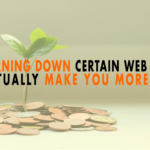How Turning Down Certain Web Design Projects Can Actually Make You More Money
- Wrong projects00:52
- Potential for future projects02:08
- Project minimum 04:01
Read the full episode transcript below:
00:28 David Blackmon: Hey everybody. Welcome to another episode of WP, the podcast. I’m David Blackmon.
00:33 Tim Strifler: And I’m Tim Strifler.
00:35 David Blackmon: …brought to you by WP Gears. Sometimes I gotta just mix it up Tim today in episode 640, we’re going to talk about how turning down certain web design projects can actually make you more money. Tim, tell us how that’s possible.
00:52 Tim Strifler: Yeah, definitely. So kind of the, the basic concept here is if you choose the wrong projects, you might be choosing projects that are a huge time suck. Maybe it’s a lower caliber client, a pain in the butt client. And when you do that, you might be missing out on. Other projects that are higher quality, higher return on investment. And so you have to know what products to choose and when, and, and, and that sort of thing. And so opportunity cost is kind of a businessy term, which has to do with the cost of. Not doing that thing. And so, for example, like if you have a bunch of money, you want to invest it into the market, you might say, okay, well, I want to invest all my money in Apple stock, right? Apple is really good, but you have to look at what the opportunity cost is of not having a diverse portfolio until you look at, okay, well, the opportunity cost is, well, if Apple goes down, you know, then I’m going to lose all my money and blah, blah, blah. And so when you choose a project, you have to look at what the opportunity cost is of that. Project. And so for a kind of a pain in the butt client while the opportunity cost is, uh, you’re not going to have time to take on a higher quality client project. Makes sense?
02:08 David Blackmon: Yeah, absolutely. Yeah. And it, it, you know, there’s a lot of factors that go into it. It’s not just about the dollar amount, you know, it could be about the, um, exposure. It could be about. You know, um, the potential for future project. So, uh, I’ll give you an example. Um, we had a customer that, um, you know, that came to us that wanted some software development. They wanted a mobile app and they wanted to use Xamarin, which is Microsoft, uh, Microsoft’s mobile app framework. And because we had. Developers in house, you know, that could handle these types of projects. It’s not our normal wheelhouse. It’s not something that we normally do because it’s just, you know, that’s not our focus Xamarin. Yeah. Developers, however, you know, the opportunity to potentially get future projects that we’re going to pay high dollar, because that’s a very niche specific programming need. So to have something like that in our portfolio was, would be good for us. So, uh, kind of an example of the opportunity costs, not something normally in our wheelhouse. Um, that, but we wanted future projects potentially. We wanted to be open to that. Cause we knew that the value there was going to be good. And it’s the same, the other way around, you know, if you take on a time suck con like. Tim talked about our point. Number two is some projects are just time sucks with low return, you know, pain in the butt client brochure website. They want a $500 website as opposed to your minimum of $3,000 or whatever that is. You know, there’s no value to that for you. There’s none. It’s just a total, you know, black hole.
04:01 Tim Strifler: Yeah. And I think one thing David kind of alluded to it to help you not. Take on projects that are time sucks for low return. And that sort of thing is to have a project minimum. And so when you have a project minimum, you know, this is the, the minimum amount that I’m willing to even. Get out of bed for type of thing. Right. And so, uh, and, and that’s, that’s a really important thing because you might be thinking, okay, well, I have a, an hourly rate that I charge that I assigned to projects and stuff like that. However, there’s a lot of factors with projects that aren’t really billable hours. It’s so much. So like, just like talking to someone on the phone to see if they’re even a good one. Yeah, that takes time and you can’t really build them for that. Um, and just the time it takes to, you know, bring them into your, your workflow and your project management system and to do all those different things, it’s like, it’s not going to be worth it for a two hour project. And so you have to have a minimum project cost, you know, depending on where you are and, uh, geographically, and then where you are in your business in terms of how long you’ve been doing it. Like those are all things that should, um, Uh, factor into what your, your minimum project costs is, but it’s like, you have to think it’s like, what is that, that amount that I’m willing to like, take on a new project for, in anything less than that? Like you just have to respectfully decline or refer them to someone else or something like that. Um, because another thing that comes into this too, it’s like, we’re talking about. Opportunity costs, minimum project costs and stuff like that. But you have to also factor in like mental energy and like the capacity to handle another client, another project. And if it’s not giving you a return, not just on your time, but also your mental energy, then you know, it’s not, it’s not worth it. And so that’s why. Turning down certain projects can actually make you more money in the long run because it frees you up, not just your time, but your mental energy to be able to take on higher quality, higher dollar amount projects.
06:00 David Blackmon: Yeah. And I think one thing David kind of alluded to it to help you not. Take on projects that are time sucks for low return. And that sort of thing is to have a project minimum. And so when you have a project minimum, you know, this is the, the minimum amount that I’m willing to even. Get out of bed for type of thing. Right. And so, uh, and, and that’s, that’s a really important thing because you might be thinking, okay, well, I have a, an hourly rate that I charge that I assigned to projects and stuff like that. However, there’s a lot of factors with projects that aren’t really billable hours. It’s so much. So like, just like talking to someone on the phone to see if they’re even a good one. Yeah, that takes time and you can’t really build them for that. Um, and just the time it takes to, you know, bring them into your, your workflow and your project management system and to do all those different things, it’s like, it’s not going to be worth it for a two hour project. And so you have to have a minimum project cost, you know, depending on where you are and, uh, geographically, and then where you are in your business in terms of how long you’ve been doing it. Like those are all things that should, um, Uh, factor into what your, your minimum project costs is, but it’s like, you have to think it’s like, what is that, that amount that I’m willing to like, take on a new project for, in anything less than that? Like you just have to respectfully decline or refer them to someone else or something like that. Um, because another thing that comes into this too, it’s like, we’re talking about. Opportunity costs, minimum project costs and stuff like that. But you have to also factor in like mental energy and like the capacity to handle another client, another project. And if it’s not giving you a return, not just on your time, but also your mental energy, then you know, it’s not, it’s not worth it. And so that’s why. Turning down certain projects can actually make you more money in the long run because it frees you up, not just your time, but your mental energy to be able to take on higher quality, higher dollar amount projects.
08:00 Tim Strifler: Take care. Bye. Bye.

Did you Enjoy this Episode?
- Will you consider sharing it online? Just click one of the share buttons below!
- Will you leave us a review? 🙂
- Have a question, or a topic request? Let us know in the comments below!
Want to Connect with David & Tim?
- David:
- Tim:








